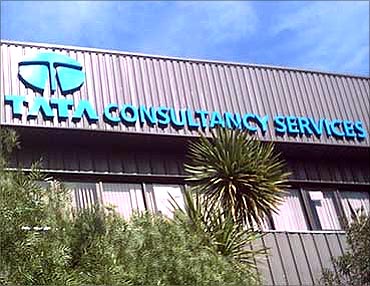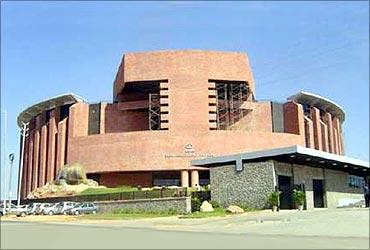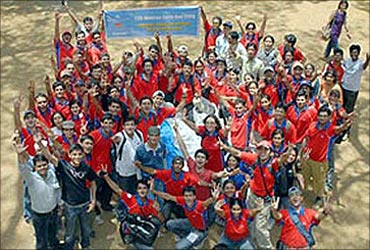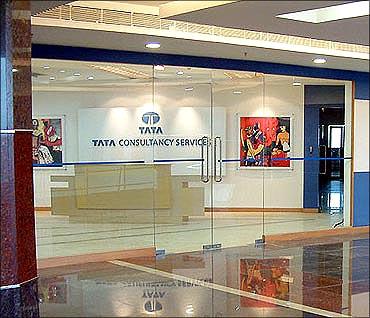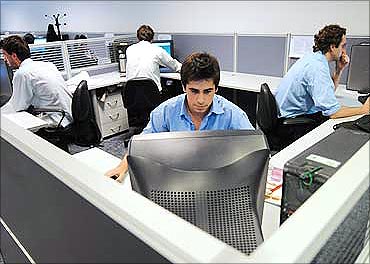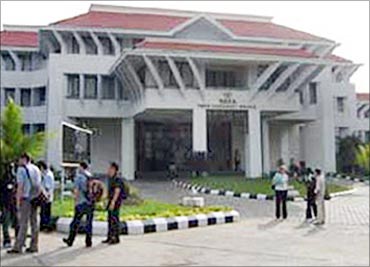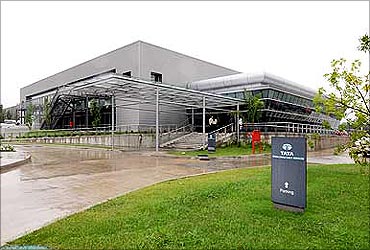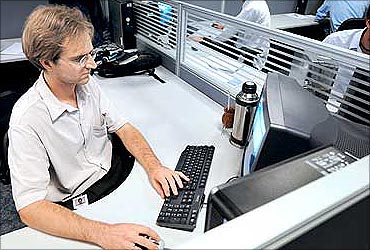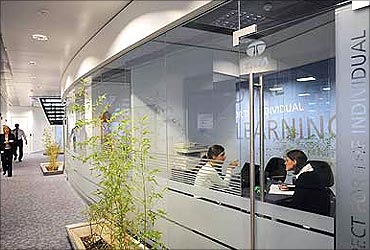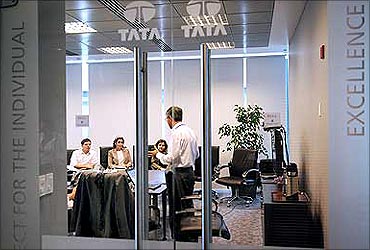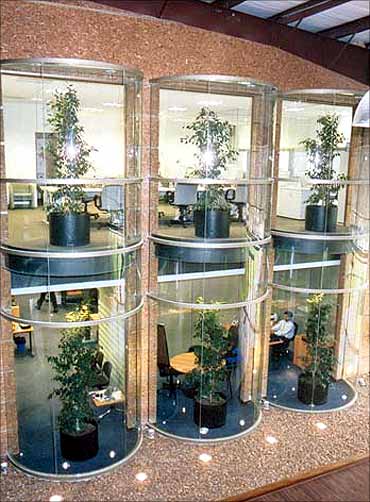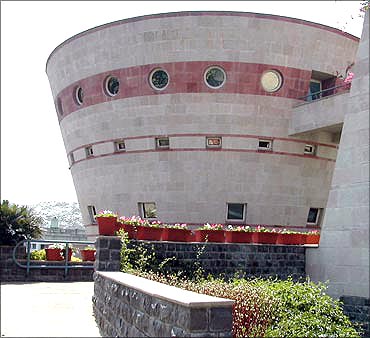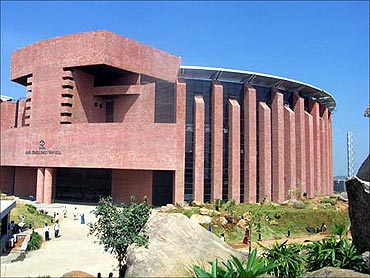 | « Back to article | Print this article |
How TCS became a global company
In an extract from the book Brand Building Advertising, authors MG Parameswaran and Kinjal Medh tell how IT major Tata Consultancy Services - once a publicity-shy company - communicated its strengths and competencies to the world.
The Indian information technology software and services industry is truly the lighthouse of modern India - an industry that has made every Indian proud and made the world take notice of India.
The software and services industry was mere $152 million in the early 90s.
However, the industry witnessed rapid growth and by 2001 it was worth $8 billion, with at least four Indian companies of significant size.
Click NEXT to read more...
How TCS became a global company
The origin of the Indian IT software and services industry is almost intrinsically enmeshed with the history of one company, Tata Consultancy Services.
Till 2002, it was a division of the venerable holding company of the Tata Group, Tata Sons Ltd.
Tata Consultancy Services, or TCS as it is referred to, began life in 1968 as a division of Tata Sons.
The growth and transformation story of the company is a part of management school case studies.
Click NEXT to read more...
How TCS became a global company
From the time when the company had to wait for several months to get permission from the government to import computers, to the day the company spanned its reach to cover the globe, is part of a story of how the Indian IT services industry came of age.
TCS in 2002-03 was a Rs. 50 billion ($1 billion) company that operated in 34 countries across six continents employing over 20,000 consultants.
From the days the company started as a service provider to Tata Group companies, TCS in 2002 was catering to six of the top 10 companies in the Fortune 500 list among its clients.
Click NEXT to read more...
How TCS became a global company
TCS is not just the largest IT software and services firm in India but it is also the undisputed pioneer.
From the days of its inception in 1968, the company has had several firsts to its credit:
i. The first software and services company in India (1968).
ii. The first Indian software company to set up operations in the US (1973).
iii. The first Indian company to conceptualise and develop the network offshore delivery model.
Click NEXT to read more...
How TCS became a global company
v. The first to establish a Global Delivery Centre (2001).
vi. The first Indian software and service company to cross the magic $1 billion revenue mark (Rs. 45 billion); (2002-03).
While TCS history was replete with a lot of firsts, the company was publicity shy and inherently reticent in nature.
The PR machinery of its Indian competitors was so well-oiled that the lay consumer often associated several of TCS's firsts with its Indian rivals.
TCS had set its sights at the global game and had resolved to be amongst the global top 10 by the year 2010.
Click NEXT to read more...
How TCS became a global company
Right through the technology and dotcom boom in the stock markets TCS continued as a division of Tata Sons Ltd.
Every once in a while the stock market would be abuzz with rumours of an impending IPO (initial public offering) of TCS, only to die down.
Tata Group decided to launch the IPO of TCS in 2004 and work was afoot for the regulatory approvals.
The IPO was expected to unlock a lot of wealth for the promoter company that had nurtured TCS over its 30-plus year history.
Click NEXT to read more...
How TCS became a global company
i. Public attention and PR coverage of a publicly listed company was always higher than a closely held division of a large group; post IPO, TCS was expected to reap this benefit.
ii. The IPO would create a size and stature for TCS that would enable it to compete with the global majors for mega-million projects.
iii. The IPO would arm TCS with sufficient financial muscle for it to pursue its aggressive growth plans: through organic means and through global acquisition.
Click NEXT to read more...
How TCS became a global company
According to Sebi IPO norms, no form of advertising with any claims was permitted during the IPO period.
All that was allowed during the IPO were statutory ads, often referred to in trade circles as 'tombstone' ads.
Sebi however permits companies to do pre-IPO advertising before the prospectus is filed/approved by Sebi.
Click NEXT to read more...
How TCS became a global company
TCS's IPO was one of the most eagerly awaited IPOs in Indian corporate history.
The company and its merchant bankers were reasonably sure that the issue would get over subscribed in just a day if not within hours, especially given the fact that the pricing was expected to "leave something on the table" for the small investor.
Click NEXT to read more...
How TCS became a global company
Given the fact that the IPO was likely to be over subscribed, was there a need for any pre-IPO advertising at all?
TCS management felt that the usual pre-IPO campaign touting the size and profits were superfluous for a company of TCS's stature and size.
If at all TCS was to do a pre-issue campaign it was to be a strategic one that would help send out the right message to the public.
Click NEXT to read more...
How TCS became a global company
A campaign just on the financial growth story would really be just talking the same language as that reported in the financial press.
As a company, TCS was one of the most low profiles IT companies in India.
Despite being the largest and a scintillating performer, TCS did not have an image to match its stature.
Therefore, the challenge was to go beyond and try to create a story about TCS which established its stature on dimensions which the target audience was not aware of.
Click NEXT to read more...
How TCS became a global company
It had pioneered the Global Network Delivery model and several other initiatives which had become industry standards.
Not only that, TCS had a worldwide presence which no other company in India could match. In fact, TCS had a presence in more countries than most airlines.
This led to the core creative idea of 'TCS - Truly Global'.
Under this creative idea, TCS decided on a four-ad campaign that presented four key facets of the company - its pioneering spirit; its global delivery model; its practice specialisation; and its research thrust.
Click NEXT to read more...
How TCS became a global company
i. 'IT' put India on the world map. But who put 'IT' on the Indian map (TCS pioneered the Indian IT software and services industry).
ii. 'When does the day end when you are working around the clock, round the world' (TCS pioneered the global delivery model).
iii. 'Money makes the world go round. But who makes the money go round (TCS has core strengths in the financial services IT software segment and more).
iv. 'Do you ever think of software saving lives?' (TCS is investing in research in this critical area of importance).
Click NEXT to read more...
How TCS became a global company
The campaign was conceived as colour full page newspaper ads. Each of the ad also carried basic bio-data of TCS:
v. Practices
Consulting; IT services; Engineering and Industrial services; Asset Based Solutions; BPO; IT Infrastructure.
vi. Size and scale
149 offices in 32 countries, over 28,000 employees of 30 nationalities in 32 countries; six clients out of the US Fortune Top 10; Global Development Centres in 17 cities in nine countries outside India.
The four-ad campaign was signed off with the tag line 'Truly Global' clearly presenting TCS not just as yet another Indian IT software and services company but as an Indian company that is global in its scale, operation, ethos and ambitions.
Click NEXT to read more...
How TCS became a global company
It was also carried as a four-page special in the Indian print run of international magazines like The Economist and Time.
The whole campaign ran for just about three weeks; till the Sebi approvals came through for the IPO.
On 29 July 2004 with the Sensex (Bombay Stock Exchange Index) opening at 5082, TCS made its IPO offering of over 55 million shares of face value Rs. 1 each through a book-building process with a bid price of Rs. 775-900 per share.
It was possibly the biggest single IPO in Indian corporate history.
Click NEXT to read more...
How TCS became a global company
The issue closed with an over subscription of 7.7 times. The IPO was priced at Rs. 850 per share making it the first billion dollar IPO in Indian history raising Rs. 54 billion ($1.2 billion).
TCS shares opened on the BSE (Bombay Stock Exchange) on August 25, 2004 at Rs. 1,050 per share, with the Sensex range bound at 5088.
The corporate campaign played a small but significant role in this success.
More importantly, the corporate campaign was successful in sending out a strong message to all stakeholders that TCS has arrived on centre stage and was ready to face the challenge of the future.
Click NEXT to read more...
How TCS became a global company
In short TCS was truly global.
Reprinted with permission of Tata McGraw Hill Education Pvt Ltd. Copyright 2011 by Tata McGraw Hill Education Private Limited. All Rights Reserved.
